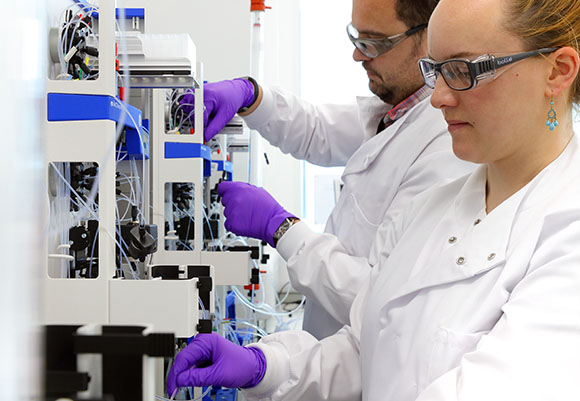While much attention in the race for treatments for Covid-19 has been on the development of new vaccines, scientists have also been looking at antibodies as an important, and more immediate, treatment option.
Antibodies that ‘neutralise the virus’ could be used to stop the infection advancing in those already infected or provide protection to those exposed to it. The challenge is in identifying and making an antibody – or several antibodies – that are safe to use in humans and could be manufactured to scale as treatments. It is no easy task.
COVID-19 Antibody Taskforce
At LifeArc, we have extensive experience in making antibodies as potential medicines. We have successfully humanised more than 70 antibodies, including four medicines on the market and four in clinical trials. So, when the Bioindustries Association (BIA) set up the COVID-19 Antibody Taskforce with a coalition of companies, charities and universities to develop neutralising antibodies to tackle the pandemic, we were a natural partner.
Our purpose and objectives as Taskforce partner
“Our objective was to deliver a monoclonal antibody, or a cocktail of antibodies, for manufacturing and pre-clinical testing by the end of the year,” says Dr Kovilen Sawmynaden, Principal Scientist at LifeArc’s Stevenage lab.

“We set ourselves an ambitious goal to accomplish the work in only seven months – rather than the industry-standard 18 months. Based on our vast experience in antibody-based therapies, we were confident that was achievable.”
As an independent medical charity, we were able to respond rapidly to the request to get involved in the Taskforce. We set about re-opening our state-of-the-art facilities at Stevenage with new Covid-19 secure processes and safety measures to protect our people. Within weeks of the project first being proposed, our antibody discovery, purification and developability teams – key workers in every sense – were back to working in our labs.
Computational analysis
Part of our work was to use computational analysis to evaluate the candidate antibodies. We also designed efficient protocols for assays to rapidly screen promising antibody candidates.
We applied these protocols to assess the potential of antibodies that are already in the public domain (open source), or to reconfirm data for proprietary candidates put forward by the commercial, charitable and academic organisations that are part of the taskforce.
We looked at the potential candidates for their ability to bind to the SARS-CoV2 Spike (S) protein. The spike protein is ultimately the primary entry of the infection, as it is responsible for binding the virus to the surface of the cells lining the nose and respiratory tract. How well an antibody can “bind and block” the spike protein determines its potential as a candidate therapeutic.
Expertise at scale
We also have the capability to scale up production of the lead antibodies, for the purpose of seeding manufacturing processes or performing additional in-depth testing and rigour. “We have been leading on screening antibodies for something we call “developability”. This is where we examine the properties of antibodies, to see if strong candidates that have been identified could go on to be developed into therapeutics,” explained Dr Sawmynaden. “This includes determining their thermal and physically stability; as protein-based drugs they should exhibit good tolerance to changes in temperature that could occur during the manufacturing process or for storage at the point of care.”
In co-operation with our partners, by the middle of September 2020 – just 14 weeks after we started – the taskforce had screened more than 600 candidate antibodies and narrowed the field down to the top 22 for final screening. This was no easy task: “It really challenged the team,” Dr Sawmynaden says. “We have been pushing ourselves to work flexibly and seamlessly as a team – an approach that has helped to expediate our aggressive timeline.”
LifeArc’s impartiality meant that our scientists could perform sensitive research tasks with intellectual property (IP) implications without bias, which was important in helping us to identify potential therapeutic candidates.
What next?
The taskforce has identified a set of candidate antibodies to be moved into the next phase of development where further screening and safety testing will need to be performed. The taskforce believes that most effective tool against COVID-19 will most likely be a defined mixture of two to three antibodies – so the effectiveness of different combinations must be assessed.
The next phase of the project will involve manufacturing the selected antibody cocktails to support initial clinical trials in 2021, to provide essential safety and efficacy data.
This is only one way in which LifeArc has been mobilising our resources to fight COVID-19 as aligned to our mission to advance translation of early science into health care treatments or diagnostics that can be taken through to full development and made available to patients. Read the latest updates about all of our efforts on the LifeArc COVID-19 hub.
UK BIA Antibody Taskforce members
- Antibody discovery: Alchemab, Imperial College London, IONTAS, Kymab, LifeArc, University of Kent and University of Oxford
- Antibody screening and assessment: Abcam, Imperial College London, LifeArc, National Institute for Biological Standards and Control (NIBSC) and University of Oxford
- Antibody manufacturing: Absolute Antibody, CPI, Kymab
- Secretariat: BIA
- Legal advice: Osborne Clarke
For more information, please visit biacovid19.org/antibodies

